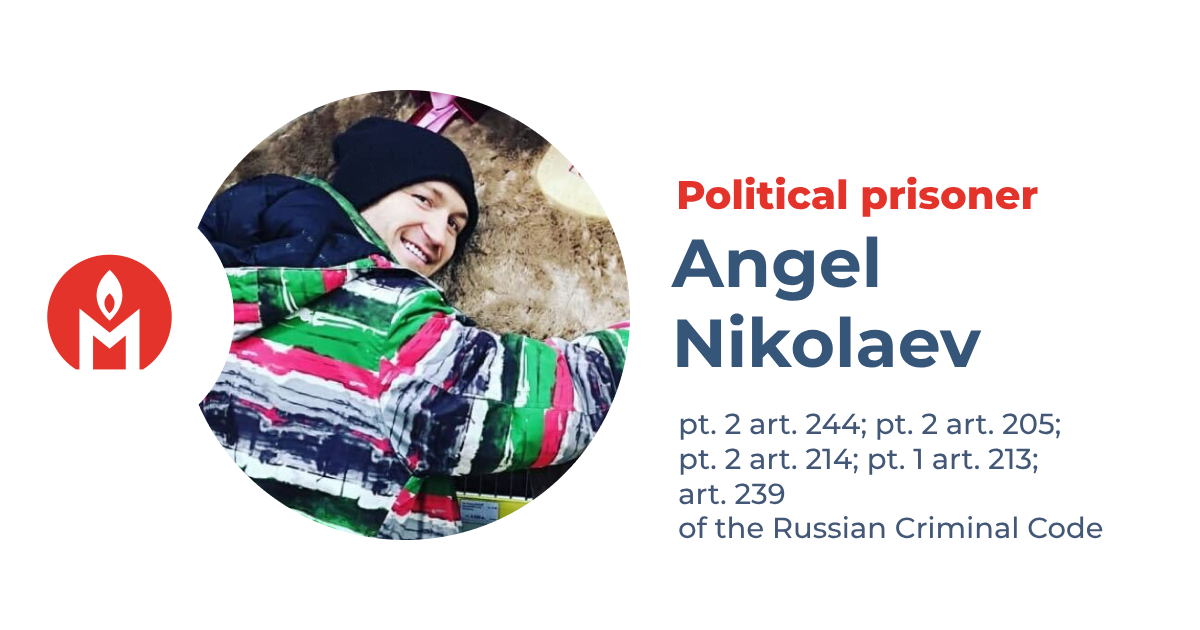Angel Nikolaev is a political prisoner
A Khabarovsk resident has been sentenced to almost 15 years’ imprisonment for setting fire to a military recruitment office and defacing pro-war symbols.
The ‘Political Prisoners. Memorial’ human rights project, in accordance with international standards, considers Angel Nikolaev a political prisoner. Nikolaev was convicted on charges of carrying out an act of terrorism by setting fire to a military recruitment office, as well as of vandalism, hooliganism, desecration of burial sites motivated by political hatred or enmity, and desecration of the Russian flag. These charges stem from damage he allegedly caused to flags on the graves of those who had fought and died in Russia’s war against Ukraine, his defacement of advertisements for military service, and his removal of ‘Z’ stickers from cars. His criminal prosecution and conviction violated his right to a fair trial. We demand that Nikolaev’s conviction be quashed, that all criminal charges against him be dropped, and that any relevant administrative-law charges against him be heard in a fair trial.

What were the charges against Angel Nikolaev?
Angel Nikolaev lived in Khabarovsk and worked as a chef. According to the prosecution, in September 2022, Nikolaev set fire to a military recruitment office in Khabarovsk in protest against mobilisation and the war against Ukraine, causing minor damage to the building. The investigative authorities classified Nikolaev’s actions as terrorism (Article 205.1, Part 1, of the Russian Criminal Code).
In addition, in November 2022 and February 2023, Nikolaev drew a symbol consisting of two crossed ‘Zs’ on Russian national flags and on the flags of military units on the graves of Russian soldiers. As a result, he was convicted of desecrating burial sites on grounds of political hatred (Article 244, Part 2) and of desecrating the Russian national flag (Article 329). In May 2023, he was additionally accused of vandalism motivated by political hatred (Article 214, Part 2) for damaging advertisements displaying Z-symbols. At the same time, Nikolaev removed pro-war stickers from vehicles and drew images on car windows, for which he was convicted of hooliganism on grounds of political hatred (Article 213, Part 1). Nikolaev pleaded guilty in part to the charges.
On 3 May 2024, Nikolaev was sentenced to 15 years’ imprisonment, with the first four years to be served in a cell-type prison. On appeal, on 12 September 2024, the sentence was slightly reduced to 14 years and 10 months.
Why do we consider Angel Nikolaev a political prisoner?
The automatic classification of attacks on military recruitment offices as terrorism appears politically motivated. In Nikolaev’s case, this charge was not justified since the investigative authorities failed to prove intent to intimidate the public or endanger human life. His actions were a form of protest against the criminal war of aggression waged by Russia, condemned by the international community.
The charges of vandalism and hooliganism were also unfounded, since Nikolaev’s actions were not aimed at insulting the public but at protesting against the war. The charge of desecration of burial sites is unlawful, as Nikolaev did not damage the graves themselves but only the flags, which are associated with the war and had been placed on them. For damaging the Russian flag (an offence under Article 329), Nikolaev was sentenced to 14 months’ imprisonment, a term which at the present time he has already served.
While some of Nikolaev’s actions may constitute offences, their legal classification was incorrect, and the punishments imposed were disproportionate to the public danger they presented. Nikolaev’s anti-war motivation in itself serves a socially beneficial purpose.
We consider the prosecution and conviction of Angel Nikolaev politically motivated and aimed at suppressing anti-war sentiment in Russian society.
A detailed description of Nikolaev’s case and of our position is available on our website.
Recognition of an individual as a political prisoner does not imply the project, ‘Political Prisoners. Memorial,’ agrees with, or approves, their views, statements, or actions.
How can you help?
You can write to Angel Nikolaev at the following address:
RU:
663180, Красноярский край, г. Енисейск, ул. Декабристов, д. 11, Т-2, Николаеву Ангелу Александровичу 1984 г. р.
EN:
Angel Aleksandrovich Nikolaev (born 1984), Prison ‘T-2’, Federal Penitentiary Service of Russia for Krasnoyarsk Krai, 11 Dekabristov Street, Yeniseisk, Krasnoyarsk Krai, 663180, Russia.
You can also send an email using the F-Pismo and ZT services (for payment with Russian bank cards) or PrisonMail (for payment with other bank cards), OVD-Info and Memorial-France (free of charge).
Please note that letters in languages other than Russian are highly unlikely to reach the intended recipient.
You can donate to help all political prisoners in Russia.
